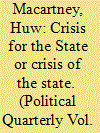| Srl | Item |
| 1 |
ID:
105865


|
|
|
|
|
| Publication |
2011.
|
| Summary/Abstract |
The Conservative-Liberal Democrat government's policy risks turning the financial crisis into a crisis of the state. This article argues that the current trajectory of the British state risks exacerbating the very social antagonisms which it has fought so hard to contain in recent years. It contends that the crisis (2007-09) was a crisis of neoliberalism and yet, paradoxically, neoliberalism-in the form of further depoliticisation and a new politics of debt-is being re-invoked to deal with the post-apocalyptic condition of the British economy. The article suggests that the state lacks the necessary political discourse to secure popular consent and-as a result-is resorting to a more coercive form of political management; and that the effects of austerity are being offset through an increased indebtedness of the British public. Both risk igniting social conflict. In the conclusion several points are indicated for an alternative political agenda.
|
|
|
|
|
|
|
|
|
|
|
|
|
|
|
|
| 2 |
ID:
134268


|
|
|
|
|
| Summary/Abstract |
Europe is facing both a political crisis of democracy and legitimacy and an economic crisis of debt and competitiveness. These crises seem to point in two distinct directions, growing social unrest over the Europeanized mechanisms of economic adjustment, and increasing efforts at strengthening those same institutions that regulate the adjustment process. Recent analyses have suggested that this failure of democracy will prove decisive; legitimacy for crisis management efforts requires a redemocratization of the European polity. Instead, drawing on an analysis of ordo- and neo-liberal traditions, the article explains how European integration was itself a response to the perceived threat of democratic demands at the domestic level. The body of the article then traces the crisis through three phases, arguing that efforts by state managers reflect a deliberate attempt to depoliticize policy-making processes. Yet the selective intervention—to restore accumulation whilst withdrawing social spending—has only fuelled the politicization of segments of European society. This threatens to test the limits of depoliticization as a governing strategy.
|
|
|
|
|
|
|
|
|
|
|
|
|
|
|
|
| 3 |
ID:
088101


|
|
|
|
|
| Publication |
2009.
|
| Summary/Abstract |
This article develops a twofold critique: on the one hand it addresses those accounts commonly associated with the Varieties of Capitalism literature and their associated understanding of neo-liberalism to argue that there is a dominant tendency to collapse into a binary analysis that asserts either we are witnessing convergence or we are experiencing path dependency. On the other hand it addresses 'neo-Gramscian' accounts which tend to overemphasise processes of transnational convergence and the emergence of a transnational capitalist class at the expense of the embeddedness of capital in national-domestic contexts. On this basis, it is argued that several contributions within political geography pose meaningful questions about the premise that neo-liberalism is inherently variegated. Principally, this involves developing the notion of variegated neo-liberalism to analyse the dynamics of a contingent neo-liberal consensus between transnationally-oriented fractions that both drives EU reform in a neo-liberal direction and reinforces domestic linkages organic to the national context. As a result, the article suggests we therefore reject the notion of a transnational capitalist class somehow detached from the national.
|
|
|
|
|
|
|
|
|
|
|
|
|
|
|
|